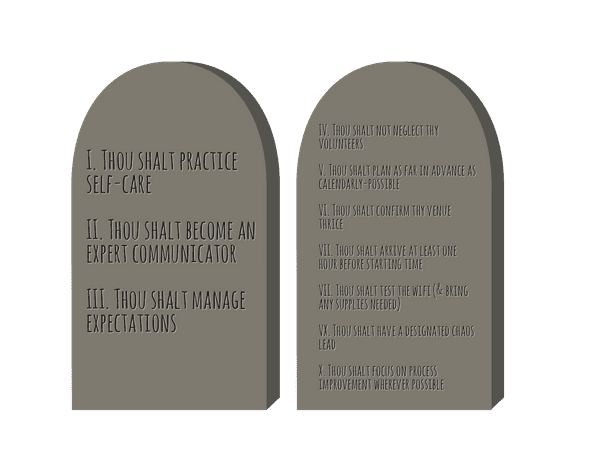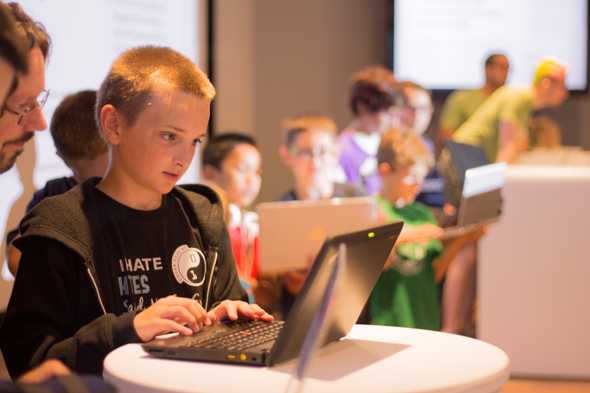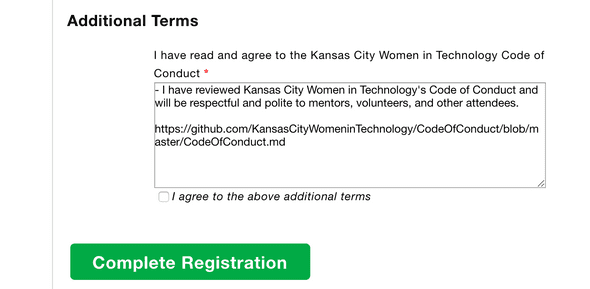10 Commandments Of Community Organizing
A guide to community organizing, what to do, how to do it, and mistakes to avoid along the way.
December 05, 2018
“Wait, this isn’t your full time job?” is a question I’ve heard more than once since founding Kansas City Women in Technology(KCWiT) over five years ago. The question speaks both to the efficacy of the work my KCWiT was doing, but also to the incredulity of the many people that don’t realize how many hours of time community organizers dedicate to building their communities WITHOUT A PAYCHECK. Community organizers are unsung heroes, pouring blood, sweat, and tears into their organizations, so hug one(consensually) today!
Vocation-based organizations play a huge part in workforce development, skill building, and leadership growth, but never seem to have enough resources dedicated to them.
I wrote a talk called “The 10 Commandments of Community Organizing” on this idea inspired by countless conversations in Slack that started with a joke “Thou shalt confirm with thy venue thrice”, and two years later as I sit in a coffee shop in Budapest where I’m delivering this talk again this week I decided to write it out in blog form. These “10 Commandments” are from lessons learned the hard way as well as lessons learned from continually seeking feedback as a leader and as an organization.
I. Thou Shalt Practice Self-care
You must avoid burnout at all costs. You are no good as a leader if you’re not at your best mentally, emotionally, and physically. When it comes to self care, it’s not about the occasional weekend spa treatment or yearly vacation escape, it’s about building a life you don’t need to escape from. A few strategies on self-care can help you immensely on the community organizing front.
Give Yourself Office Hours
Learning to own your calendar can help you manage your own time efficiently. I have my mornings before starting my software engineering job to spend answering emails and take coffee meetings, and evenings are reserved for one on ones with my team and cocktails with girlfriends. I have Sunday mornings blocked off for blogging and grant-writing or any other brainpower intensive activities on my to-do list for KCWiT.
One of my favorite tools to use is Calendly. It integrates with my calendar and allows me to set windows of time during which people can schedule me for meetings.
Do guard your time carefully - it is the biggest asset you have to offer your community. This means learning to say “no” to things that detract from your mission or that you simply don’t have capacity for. It’s ok to say no, or to say you’d be interested in revisiting an idea at some point in the future.

On the note of guarding time, I’d like to share with you Jennifer’s First Law:
A person’s incompetence in email is DIRECTLY PROPORTIONAL to the likelihood that they will massively waste your time.
I do always believe the best in people, but as Jennifer’s First Law has proven correct time and time again, I’ve learned to watch for people/activities that will waste my time, therefore taking time from people/activities I could be effectively serving. This may sound harsh, but I’m a big believer in “The needs of the many outweigh the needs of the few” (- Spock).
Find a Task Management System that Works for You
Everything in my life lives in Trello. Upcoming trip planning, conference talk submissions, my never ending task list for KCWiT work, even meal prep ideas. This works for me to organize my chaos, so I recommend finding a tracking tool that works for you. Humans are imperfect and we forget things
Learn to Handle Feedback, Then Take on Small Tasks and Improvements.
It can be easy to get overwhelmed by the never-ending to-do list of community organizing, let alone trying to handle solicited(and more-often-than-not unsolicited) feedback. For starters, learning how to handle feedback is key.
You may be inclined to tune out feedback(this is my nice word for criticism, heh) because you’re already doing a million things, and this community work you do out of your own spare time and money so who are they to judge? But this is a mindset that will be ultimately detrimental to the growth and sustainability of any community your organize. Conversely, letting feedback crush your self-esteem and cause you to quit isn’t good either.
Once you’ve sifted through feedback and improvement suggestions, break these down into small, executable pieces to be implemented on an agile timeline. It can be easy to get excited about big picture ideas and improvements, but you have to consider the limitations of a volunteer workforce. Get into the habit of breaking executables down as small as possible, and your team will be able to accomplish more faster with much less stress.
Build A Team & Learn to Delegate
Managing volunteers is hard and I’m not going to sugar-coat that, but it can also be one of the most rewarding ways to grow as a leader. There are no salaries keeping your team members around, your group will succeed or fail completely based on your leadership skills, the way you treat your team, and the way you inspire them to stay in line with the groups mission.
Coding & Cocktails team <3
coming at some point - blog on building volunteer teams
Build Your Network
This may be the most crucial piece of self-care advise I have - find a support system. You’ll often be surrounded by attendees and people who aren’t aware of the level of effort that goes into community organizing, which can be isolating and frustrating. Finding people who understand community development, have shared your struggles and have ideas or simply an open ear can be the best way to learn, grow, and avoid burning yourself out as a community leader.
Feel free to ping me for an invite to a community organizer Slack I run: https://communityorganizer-hq.slack.com
II. Thou Shalt Become An Expert Communicator
Make this your mantra - Never assume people are as tuned in to your organization as you are. People have their own lives and priorities and scheduling conflicts, which is easy to lose sight up when you’re juggling a million things to ensure your events run well.
Choose Your Communication Style Based on Your Recipient
First step in becoming an expert communicator - make your communications clear and readable. Think about the person on the receiving end lacking the knowledge you have in regards to the subject. Ensure communication efforts across a team are coordinated - nothing causes more frustration for volunteers and attendees alike than leadership sending mixed messages regarding start times, talk lengths, etc.
Tips & Tricks for Email Communication
- Use bulleted lists and small paragraphs.
- Line breaks are your friend.
- Format your dates - Day of week, date, time + timezone
- If you want a response, end with a CTA + specific deadline
- Pay attention to ‘reply’ & ‘reply all’
- When bulk emailing a group of people, use the BCC field to protect their privacy
Know When to Slack
I feel like Slack has become a communication crutch for many organizations. Though it has become heavily utilized in the tech work sector, not all companies allow it’s usage during work hours. Using Slack as a primary organization tool is convenient, but also easily leaves team members out of conversations if they don’t have the same level of access as everyone else. As KCWiT has grown, we’ve added several team members that don’t come from chat-utilizing environments, so we make a conscious effort to ensure important information is always communicated to the whole team via email.

And for the love of all that is good, DO NOT USE SLACK FOR HAVING FEEDBACK CONVERSATIONS. I have witnessed more team member conflicts come out of terse or misconstrued Slack messages than anything else. This will take conscious cognizant effort on your part to coach your teams away from Slack and to phone or in person for more intense conversations. Many people are conflict avoidant and will stray towards the lowest-contact method which is often slack.
When In Doubt, Over-Communicate
Many of my early leadership flubs were around not communicating directions, plans, and vision clearly enough. Explaining the “why” of decision making is crucial for buy-in, especially when as a leader you might respond “no” to a team members suggestion. A struggle I have is explaining my internal decision making process, which starts with finding any points of failure in a pathway based on previous experience, feedback, and research. I’m currently working on not saying “no” quickly & without explaining all those points of failure I’ve processed to my team, which can lend the appearance of shooting down ideas for fun and inadvertently create a culture where people don’t share their ideas.
III. Thou Shalt Manage Expectations
Repeat after me.
People are not psychic.
People are not psychic.
People are not psychic.

As discussed in the communication section, the world does not revolve around you and your events, and people won’t know exactly what’s going on or what to expect, and some people will just never be the types to read the FAQs. (Just accept this, it’s less infuriating in the long run)
“Well I thought it was going to be this …” - random attendee
The better you can set people up for your events, the better the outcome & the less complaints you will get. Write, review, and rewrite your event descriptions. Get outside opinions. Take advice from the ‘explain like I’m five’ subreddit. The key here is when people know what to expect/what they’re getting into, the less off-the-wall criticism you will receive. I feel like this is a bigger deal in the tech space because coding/tech is so elusive and hard to understand for people, they have no way to manage their own expectations.
Example - when people sign up for a coding event, they think the whole time will be spent coding. They have no concept of getting their environment set up, downloading an IDE, installing necessary plugins, and heaven forbid they don’t have Xcode already installed before the session. When large chunks of time are spent on setup and troubleshooting attendees get very frustrated and upset, unless this is clearly explained beforehand.
When we run weekend coding workshops we always have a Friday night “install party”, and communicate to our attendees the evening will be spent installing the tools they need and getting their environments set up so they can hit the ground coding Saturday morning. This has led to much happier attendees - just because we managed their expectations. = )
When posting events information, make sure to include information about the following
- Arrival times
- Parking
- Food/beverages
- Whether to bring a laptop or additional supplies
- How to cancel
- Any questions you’ve answered more than once
Set Boundaries
Part of managing expectations is setting boundaries. People make this strange assumption that because you’re doing work for cheap/free that economies of scale don’t apply to you, and you should be able to do anything and everything. Attempting to do so is a one-way ticket to Failcity. You need to get comfortable politely reminding people about the limits of your organization, and be protective of your team’s personal contact information(seriously, NEVER give out phone numbers, people do not respect boundaries once they have someone’s number).
I’ve been harangued by parents on multiple occasions insisting that I come run a coding program at THEIR child’s school, and I’ve learned to politely but forcefully push back and explain that I am one person, that my organization is volunteer run, and we cannot possibly fulfill the overwhelming demand for computer science education, but I’m more than happy to share our resources so they can start their own program.
Crazies Gonna Cray

This is Corinne, one of my favorite Bachelor villains of all time. Some of the shit she pulled on the show was impressively absurd, like sleeping through a Rose Ceremony, and certainly wigged out the other contestants. She’s like if the Joker and Chloe Kardashian had a baby - a super hot conveyer of chaos for the sheer delight of chaos. But seriously, no matter how well you run events, and how hard you try to improve, some people will never be happy. They will find any reason to complain, bitch, cause problems, or chew you and your team out. It’s important to be able to spot these types, and realize they just want to complain and aren’t looking for a tangible outcome.
One of my favorite stories to share is the one time this man showed up to a KCWiT TechTalk and started screaming at me about how his daughter in college is a Computer Science and her friends make fun of her for liking computers and she doesn’t have a mentor and what the hell is my organization going to do about that. After multiple attempts to de-escalate the situation and explain we(KCWiT) weren’t large enough to reach colleges an hour+ away yet, I finally offered to give him my personal email address so his daughter could contact me for mentoring. He retorted that wouldn’t work, since his daughter doesn’t listen to anything he says, and stalked away. The dude literally just showed up to our event to yell at me. Crazies gonna cray.
IV. Thou Shalt Not Neglect Thy Volunteers
Volunteers are the lifeblood of communities, but are often the most neglected. I cringe every time I’m at a conference or event and see volunteers at a checkin table starting longingly at the lunch line because the organizers completely forgot their volunteers need to eat too!
Do Not Make Your Volunteers Herd Cats

Volunteers are donating their free time and they want to be useful! If you want your volunteers to keep coming back, provide them with tasks and duties that they can act autonomously on instead of having to beg for instructions. It’s helpful to break down all the tasks that go into running an event ahead of time and section out to employees. Duty breakdowns might look like:
- Managing check-in
- Event setup/teardown
- AV Testing
- Putting out food
- Coordinating vendors
- Introducing speakers
- Letting in late attendees through locked doors
Being able to direct volunteers to these activities will make them feel productive and like they’re actually contributing, instead of standing idly trying to think of ways to be helpful. This is going to take more upfront work on your part, but will lead to smoother running events and a dedicated volunteer base that enjoys working with your group.
Make Things Easy For Your Volunteers
This ties into clear communication and managing expectations, but just another reminder that your volunteers are also not psychic.
- Send calendar invites with address + desired arrival time
- Make parking and arrival instructions clear
- Have clear instructions, duties, and responsibilities for your volunteers
- Have an emergency contact number available(ladies, you can use a free number from Google to route to your phone)
- If an event is deviating from a normal time/venue - send reminders = )
- As much as possible keep your volunteers out of the line of fire of criticism (see earlier “Crazies gonna Cray”)
DO NOT FORGET TO FEED YOUR VOLUNTEERS
You’ve probably seen the snickers commercials: “You’re not yourself when you’re hungry”. This is true for your volunteers, so make sure to provide snacks, include them in your dining headcount, and schedule times for them to eat!
Find Ways to Thank Your Volunteers
Most of the time people are dedicating their time because they care about a cause, not because they’re looking to collect money or riches. This doesn’t mean we shouldn’t be looking for other ways to reward them and show them how much we appreciate their efforts!
- Solicit their feedback AND act on it
- Offer leadership opportunities
- Provide nice volunteer shirts
- Plan appreciation dinners/parties
- Promote their efforts (social media, blog profiles)
- Nominate them for awards
Again, this WILL take more effort and time on your part - but it will keep your volunteers coming back and keep your community growing.
V. Thou Shalt Plan As Far in Advance As Calendarly-Possible
It’s easier to set a 6 month timeline and fill in gaps as you go. I know it sounds terrifying to try to plan that far out, but it cuts down on monthly drama like event posting, social media scheduling, and remembering to check in with venues and speakers. Consistency is key - give people something they can regularly schedule around. Meetups and events are much better attended when they’re on consistent dates and at consistent venues.
It’s also much easier to book speakers, panelists, volunteers, and venues a few weeks in advance instead of attempting to scramble things together the two weeks before a set event date.
On that note, if you’re going to make a diversity effort at your events, do it sooner rather than later. Diversity & inclusion should not be an afterthought. I get incredibly annoyed when I get an email asking me less than 24 hours in advance to participate in a panel because someone suddenly realized their panel is all white dudes and don’t want to get called out for lacking diversity. Make an effort. Do your homework, research speakers and industry leaders, step outside your comfort zone, troll Linked In to find diverse people you may not know in person.

VI. Thou Shalt Confirm Thy Venue Thrice
Another mantra for you - CYA.
Cover Your Ass.
Vendors, venues, and speakers have more to focus on than just your event. They also may have changes in process, changes in staff, or a million other reasons why your event could fall off their radar. With KCWiT we set a calendar reminder for 3-4 days before every monthly event to check in with our venue. For larger events with larger timelines we check in once a month, as well as week-of. We’ve been locked out of venues before because they forgot, but it was us who was disappointing our attendees for not providing a secure space.
In a perfect world, this wouldn’t be an issue, but we don’t live in a perfect world, so cover your ass and triple check to make sure your event runs as promised. As an event organizer it is your responsibility to ensure your event runs as advertised. Your participants don’t care that it wasn’t your fault, they will simply feel their time was wasted by your organization and never return.
Another quick note about venues - if you want to be allowed to use their space again, be a courteous guest! Give them shoutouts on social media, clean up after yourself, and don’t overstay your welcome! Attendees love to socialize after events, but politely kick their butts out when it’s time so the staff at the venue can go home to their families(or furbabies. or plants)!
VII. Thou Shalt Arrive At Least One Hour Before Starting Time.
There are certain truths in community organizing and event running. Your attendees will show up early. Your speakers/panelists will show up late. Setup will take longer than you think. The first year we ran a Django Girls event we set the start time for 7pm Friday night, with our team planning to leave work around 5 and arrive at the venue to set up. What we didn’t count on is attendees heading to the venue right after work as well, which meant we had around 30-50 women sitting on the floor of the lobby for about an hour while the team scrambled to get the space ready for our event.
VIII. Thou Shall Test the Wifi (& bring any other supplies needed)
No wifi or shoddy wifi will tank your technical event in a heartbeat. Make sure you have contact info for whoever can access the router. If possible, test the event ahead of time, and have a backup plan in case of wifi issues. We run a Jewelbots workshop and part of working with Jewelbots includes downloading some boards for the Arduino IDE which takes a while. We played around and discovered we could store the boards on a USB and save the attendees the download time and get right to coding the bracelets!

It’s also smart to have your own dongles, portable speaker, HDMI cord, etc collection. Technically it’s a speaker’s responsibility to bring their own adaptors, but we don’t like in a perfect world, remember, so CYA! There have been times where we’ve shown up to a consistent venue only to have TVs, cords, or microphones that were usually there missing, so we began to rely on our own inventory to help events run smoother.
VX. Thou Shall Have a Designated Chaos Lead
No matter how well you follow these commandments and no matter how well you plan, Murphy’s Law will reign.

Murhpy’s Law - What Can Go Wrong Will Go Wrong.
There will always be situations or crises you can’t plan for. Leadership, mentors, and volunteers with dedicated roles can’t be running around to solve problems on the fly, which is where chaos leads come into play. They can fetch ice, find the person to reset the router, figure out where to store leftover food, or find the first aid kit should situations arise. I will forever be traumatized by a story an event organizer told me where they showed up to a venue to run a weekend coding workshop, only to discover an hour in the janitorial staff hadn’t been in and there was no toilet paper in the women’s bathroom. What coding workshop organizer would ever think “hm, I should check that there’s toilet paper in this public venue”??? Not me, well, at least not before I heard that story. Murphy’s Law, ya’ll.

Fake Moody may have been referring to dark wizards here, but this applies to community organizing too.
X. Thou Shall Focus on Process Improvement Wherever Possible
Retrospectives - Not Just for Software Sprints!
Holding retros right after events is one of the most productive process improvement strategies you can implement. Have everyone who helped run the events give their feedback during your retrospectives immediately after while things are fresh in memory. Not only will they have ideas for how to help things run better, but they might have heard or observed important thins you would never hear about even when soliciting feedback from attendees via survey. Simply ask
- What went well?
- What didn’t go well?
- What should we do next time?
Optimize All The Things
As software engineers, optimizing should come naturally. Start with repeat questions - these should be clearly explained on an FAQ page. If you keep getting the same sorts of questions, make those harder for people to miss on the event page. If you still have issues, go full “yes I read the terms and agreements” on those bits of information and embed those in your signup process.
The less time you have to spend responding to emails, the more time you get back in your life!
It also helps to identify your pain points and start process optimization there. What stresses you/your team out the most? How can you improve that? It’s ok to make rules as well as processes. We won’t return to venues that have locked us out or pulled last minute policy changes on us, and we won’t hold special coding classes in schools.
Prioritize Data Gathering
Finally, prioritize gathering data as soon as you can. If you want your group to grow, that will take money, and people giving you money will likely want to see the results of their investment. If you can create your data-gathering process early, you’ll set yourself up for great success later on, as well as being able to make decisions based on data, woo!
I built a rough analytics dashboard for KCWiT attendee data here - you can see registration data broken down by year and program, and then drill down into more recent events for attendee demographic data.
So there we have my 10 Commandments of Community Organizing. I hope this helps community organizers both old & new, cheers from Budapest! <3








